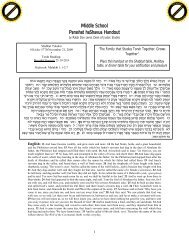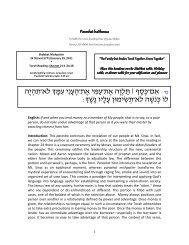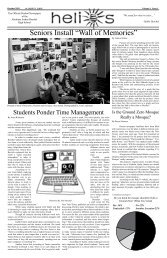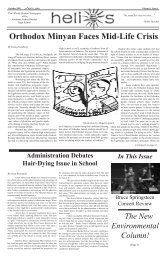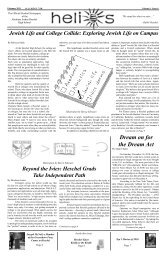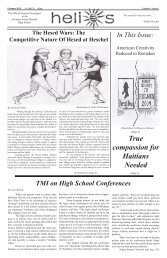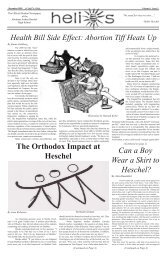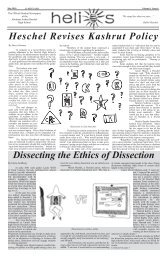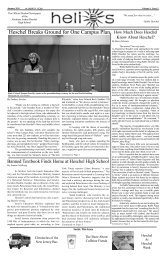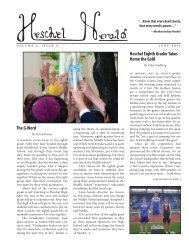Obama Continues the Fight to end Racism - The Heschel School
Obama Continues the Fight to end Racism - The Heschel School
Obama Continues the Fight to end Racism - The Heschel School
Create successful ePaper yourself
Turn your PDF publications into a flip-book with our unique Google optimized e-Paper software.
Page 6 Helios Volume 7 Issue 2 December 2008<br />
Transforming <strong>the</strong> “Lost” Generation<br />
By Anna Rothstein and Rebecca Schwarz<br />
<strong>The</strong> <strong>the</strong>me of this year’s Shabba<strong>to</strong>n,<br />
dren and homeless<br />
<strong>the</strong> “Lost” Generation, left <strong>the</strong> people, cookdren<br />
entire school thinking of ways <strong>to</strong> avoid<br />
a dark future with a troubled economy<br />
ing and serving<br />
meals in<br />
and global warming. Thinking locally, soup kitchens,<br />
one strategy <strong>to</strong> help change this generation<br />
for <strong>the</strong> better is <strong>to</strong> turn <strong>the</strong> high<br />
school green.<br />
<strong>The</strong> Student Senate has plans<br />
and sort-<br />
ing and packing<br />
foods in<br />
a food warehouse.<br />
<strong>to</strong> improve <strong>the</strong> school’s recycling program<br />
<strong>The</strong><br />
by spreading awareness of how <strong>to</strong><br />
properly use <strong>the</strong> recycling bins located<br />
around <strong>the</strong> school. Almost every classroom<br />
has a bin for containers (such as<br />
plastic and glass bottles and cans) and a<br />
bin for paper. However, students often<br />
deposit a mix of paper, containers and<br />
trash in each bin; as a result, everything<br />
in <strong>the</strong> bins is just thrown out. Student<br />
senate also hopes <strong>to</strong> persuade teachers<br />
<strong>to</strong> use less paper, doing more electronically<br />
instead.<br />
Ano<strong>the</strong>r approach <strong>to</strong> helping<br />
change <strong>the</strong> world and <strong>the</strong> future is<br />
through Hesed. On Wednesday, November<br />
26th, <strong>the</strong> entire school participated<br />
in Hesed projects all around <strong>the</strong><br />
city. <strong>The</strong> ninth grade cooked a Thanksgiving<br />
meal in school for <strong>the</strong> homeless.<br />
<strong>The</strong> tenth and eleventh grades went<br />
out <strong>to</strong> different locations in Manhattan<br />
and <strong>the</strong> boroughs, working with chil-<br />
twelfth grade<br />
went <strong>to</strong> clean<br />
up an old Jewish<br />
cemetery.<br />
A<br />
standing issue in<br />
<strong>the</strong> <strong>Heschel</strong> <strong>School</strong><br />
remains how <strong>to</strong> motivate<br />
students <strong>to</strong> participate<br />
in community service<br />
activities? Last year,<br />
many students did not come<br />
<strong>to</strong> Hesed day. Leaving aside<br />
<strong>the</strong> issue of families choosing<br />
<strong>to</strong> leave for vacations a day early,<br />
many students choose <strong>to</strong> skip school<br />
and catch up on sleep instead. Hesed<br />
days are not optional, however; <strong>the</strong>y<br />
are manda<strong>to</strong>ry, school-wide activities.<br />
<strong>The</strong> more people who join in helping<br />
on Hesed day, <strong>the</strong> more <strong>the</strong> community<br />
can be changed for <strong>the</strong> better and <strong>the</strong><br />
better <strong>the</strong><br />
w o r l d<br />
c a n<br />
become.<br />
Thanks <strong>to</strong><br />
<strong>the</strong> determination<br />
of<br />
<strong>the</strong> Student<br />
senate, <strong>the</strong><br />
Hesed club,<br />
and <strong>the</strong> community<br />
service<br />
group that meets<br />
during Arts Block, <strong>the</strong><br />
<strong>Heschel</strong> high school is<br />
taking steps <strong>to</strong> change its<br />
world. Perhaps, in <strong>the</strong> new environment<br />
<strong>the</strong>y are creating, everyone will<br />
be motivated <strong>to</strong> do more: whe<strong>the</strong>r by<br />
recycling that Snapple bottle bought<br />
during lunch or showing up for <strong>the</strong><br />
next Hesed day.<br />
Illustration by Shelly Kaplan<br />
All Women’s Colleges: Are <strong>The</strong>y for You?<br />
By Abigail Lipnick and Aliza Rosenfeld<br />
nard classes<br />
and I also <strong>to</strong>ok<br />
a lot of classes<br />
at Columbia<br />
right across<br />
<strong>the</strong> street, so<br />
I wasn’t isolated.<br />
I did<br />
t<strong>end</strong> <strong>to</strong> have<br />
more female<br />
fri<strong>end</strong>s, but I<br />
think I would<br />
have anyway,<br />
and <strong>the</strong>re were<br />
men around in<br />
classes, some<br />
Illustration by Hannah Kober<br />
Seven all girls’ high schools are<br />
of <strong>the</strong> dorms,<br />
on campus,<br />
etc.”<br />
located in New York City, all on <strong>the</strong> Upper<br />
East Side. For girls att<strong>end</strong>ing <strong>the</strong>se schools,<br />
college is a time <strong>to</strong> break free from <strong>the</strong> allgirl<br />
bubble. Many of <strong>the</strong>m want <strong>to</strong> go <strong>to</strong><br />
a co-ed college for a more diverse atmosphere.<br />
Sara Winograd, a <strong>Heschel</strong> Middle<br />
<strong>School</strong> alumnus who now att<strong>end</strong>s Spence,<br />
remarked that although most students at<br />
Spence love <strong>the</strong> single-sex environment<br />
now, <strong>the</strong>y are most likely ready for change<br />
Ms. Slutsky believes strongly in<br />
<strong>the</strong> benefits of having a primarily singlesex<br />
classroom environment. In her experience,<br />
“boys and men t<strong>end</strong> <strong>to</strong> be more<br />
outspoken in class and sometimes speak<br />
before <strong>the</strong>y think…<strong>the</strong>re were definitely<br />
some aggressive women.” In general, however,<br />
she claims that she had more time <strong>to</strong><br />
consider her responses <strong>to</strong> questions and<br />
discuss <strong>the</strong>m in a more thoughtful environment.<br />
by <strong>the</strong> <strong>end</strong> of four years. At Spence, only<br />
Ano<strong>the</strong>r reward <strong>to</strong> being in an all-<br />
seven girls out of <strong>the</strong> two hundred and<br />
thirty -one graduates of <strong>the</strong> last five years<br />
have att<strong>end</strong>ed all women’s colleges. Sara<br />
explains that “being in an all girls’ school<br />
for childhood and adolescence makes maturing<br />
girls confident <strong>to</strong> be or do anything.<br />
By <strong>the</strong> time <strong>the</strong>y enter college it is important<br />
<strong>to</strong> also be comfortable, in and out of<br />
<strong>the</strong> classroom, socializing as well as collaborating<br />
with males.”<br />
A common concern of women<br />
who are thinking of att<strong>end</strong>ing all women’s<br />
college is <strong>the</strong> difficulty of meeting men but<br />
it is not really an issue. Carolyn Slutsky,<br />
who teaches <strong>the</strong> Journalism elective during<br />
Friday’s arts block and att<strong>end</strong>ed Barnard,<br />
offers assurance that men are accessible<br />
and states, “<strong>The</strong>re were men in many Barwomen<br />
atmosphere is that it allows those<br />
who are passionate about women’s rights<br />
and feminist values <strong>to</strong> comfortably express<br />
such sentiments. Ms. Slutsky acknowledges<br />
that at George Washing<strong>to</strong>n University,<br />
which she att<strong>end</strong>ed before transferring <strong>to</strong><br />
Barnard, “feminism was sort of stronger<br />
or more militant because you had <strong>to</strong> fight<br />
<strong>to</strong> feel equal and heard.” She par<strong>to</strong>ok in<br />
women’s rights issues on both campuses<br />
but commented, “at Barnard it felt more<br />
comfortable and integrated than at GWU<br />
where as a woman I still felt I had <strong>to</strong> fight a<br />
little harder.”<br />
Over <strong>the</strong> past few years several<br />
<strong>Heschel</strong> students have enrolled in women’s<br />
colleges. A number of girls in this year’s<br />
senior class are also looking in<strong>to</strong> all women’s<br />
schools. In addition <strong>to</strong> Barnard, notable<br />
women’s colleges in <strong>the</strong> U.S. include<br />
Mount Holyoke, Smith, and Wellesley.<br />
Most young women at <strong>Heschel</strong> do not feel<br />
intimidated by <strong>the</strong>ir male peers. Yet, it is<br />
probable that later in <strong>the</strong>ir lives <strong>the</strong>y will<br />
encounter sexism, injustices, and double<br />
standards in society. An all women’s college<br />
can serve as an incuba<strong>to</strong>r, getting<br />
young women ready <strong>to</strong> cope with <strong>the</strong> various<br />
challenges that so often exist for <strong>the</strong>m<br />
in society. According <strong>to</strong> <strong>Heschel</strong>’s college<br />
guidance counselor, Micki Talmadge, “both<br />
in college and after graduation, women<br />
who att<strong>end</strong> women’s colleges t<strong>end</strong> <strong>to</strong> take<br />
on more leadership roles, e.g. over 75%<br />
of <strong>the</strong> women heading Fortune 500 companies<br />
att<strong>end</strong>ed a women’s college, and<br />
women who att<strong>end</strong>ed a women’s college<br />
are more likely <strong>to</strong> succeed in traditionally<br />
‘male fields,’ e.g. math, science, engineering,<br />
business.”<br />
Many girls enjoy single-sex environments<br />
where <strong>the</strong>y feel <strong>the</strong>y can thrive<br />
best. However, some apply <strong>to</strong> or att<strong>end</strong> all<br />
women’s colleges “in spite of <strong>the</strong> fact that<br />
<strong>the</strong>y are all women,” states Ms. Talmadge.<br />
“When thinking about what <strong>the</strong>y want in<br />
a college, while <strong>the</strong>y may find it in a coed<br />
school, <strong>the</strong>y may also find it in a women’s<br />
college.” All-women classrooms can help<br />
females focus more on <strong>the</strong>ir education in<br />
<strong>the</strong> absence of <strong>the</strong> distractions that sometimes<br />
come when men are around. Many<br />
women feel stifled by <strong>the</strong> forthright nature<br />
of some men and prefer not <strong>to</strong> compete<br />
with men for attention from <strong>the</strong> professor.<br />
Ms. Slutsky liked <strong>the</strong> idea that Barnard<br />
was “a school that focused on women<br />
and <strong>the</strong>ir learning style and needs and power<br />
and development.” She found that, particularly<br />
given that classes at Barnard were rigorous<br />
and challenging, being in some classes with<br />
only women allowed her <strong>to</strong> formulate her<br />
opinions more slowly and thoughtfully. She<br />
maintains that Barnard taught her “that sense<br />
of women being empowered and strongminded<br />
and competent and worthwhile.”<br />
Op-ed: <strong>The</strong> Issue<br />
of Eleva<strong>to</strong>r Use<br />
By Benjamin Seidman<br />
Using <strong>the</strong> school eleva<strong>to</strong>rs<br />
during <strong>the</strong> day is not a privilege<br />
or a right given <strong>to</strong> <strong>Heschel</strong> High<br />
<strong>School</strong> students. Only teachers,<br />
faculty members, and <strong>the</strong> battered<br />
and bruised of <strong>the</strong> student body<br />
can use <strong>the</strong> eleva<strong>to</strong>rs. To everyone<br />
else, <strong>the</strong> eleva<strong>to</strong>r is a sacred domain,<br />
only accessible in <strong>the</strong> mornings<br />
and at <strong>the</strong> <strong>end</strong> of <strong>the</strong> school<br />
day.<br />
Seniors have expressed<br />
<strong>the</strong>ir displeasure with <strong>the</strong>ir inability<br />
<strong>to</strong> use <strong>the</strong> eleva<strong>to</strong>rs. Said one<br />
senior, “I feel like after all <strong>the</strong>se<br />
years of walking up <strong>the</strong> stairs, we<br />
need a break.” Ano<strong>the</strong>r sophomore<br />
said, “I see upperclassmen using it<br />
and I just do not understand why<br />
<strong>the</strong>y have <strong>to</strong> try and avoid teachers<br />
<strong>to</strong> use <strong>the</strong>m. I understand that<br />
administra<strong>to</strong>rs do not want <strong>to</strong><br />
overcrowd <strong>the</strong> eleva<strong>to</strong>rs, but <strong>the</strong>se<br />
are our seniors. Shouldn’t we cut<br />
<strong>the</strong>m some slack?”<br />
Senior privileges used <strong>to</strong><br />
allow <strong>the</strong> senior class <strong>to</strong> ride <strong>the</strong><br />
eleva<strong>to</strong>r at will, but <strong>the</strong>y have<br />
been revoked in recent years. <strong>The</strong><br />
privileges were rescinded because<br />
of <strong>the</strong> ever-growing size of <strong>the</strong> senior<br />
class, which overcrowds our<br />
two eleva<strong>to</strong>rs, and because using<br />
<strong>the</strong> eleva<strong>to</strong>rs leads <strong>to</strong> a loss of exercise<br />
from using <strong>the</strong> stairs.<br />
Regrettably, seniors and<br />
<strong>the</strong> rest of <strong>the</strong> student body still<br />
use <strong>the</strong> eleva<strong>to</strong>r and are often penalized<br />
as a result. Faculty members<br />
who witness students in any<br />
grade using <strong>the</strong> eleva<strong>to</strong>r have no<br />
choice but <strong>to</strong> assign detentions <strong>to</strong><br />
those trespassers.<br />
If seniors were given <strong>the</strong><br />
right <strong>to</strong> use <strong>the</strong> eleva<strong>to</strong>rs, less tension<br />
would exist between faculty<br />
and students over this delicate<br />
issue. <strong>The</strong> ninth, tenth, and eleventh<br />
grades would look forward<br />
<strong>to</strong> senior year as a time when <strong>the</strong>y<br />
<strong>to</strong>o could exercise <strong>the</strong> privilege<br />
of using <strong>the</strong> eleva<strong>to</strong>r. This system<br />
would develop a respect for eleva<strong>to</strong>r<br />
use and students would think<br />
twice before entering an eleva<strong>to</strong>r<br />
instead of climbing <strong>the</strong> stairs. If<br />
eleva<strong>to</strong>r use were deemed a privilege<br />
for <strong>the</strong> senior class, younger<br />
students would not disobey <strong>the</strong> eleva<strong>to</strong>r<br />
policy because <strong>the</strong>y would<br />
know that one day, <strong>the</strong>y <strong>to</strong>o would<br />
be able <strong>to</strong> ride <strong>the</strong> eleva<strong>to</strong>r. That<br />
is, once <strong>the</strong>y earn it by climbing<br />
up and down our seven floors for<br />
three years.



